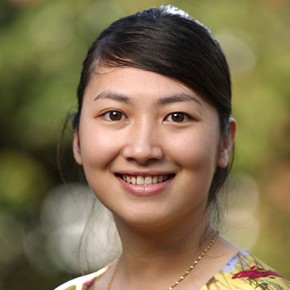
Thinh Nguyen
Vietnam
- Program Year
- 2012-13
- Country of Current Residence
- Vietnam
- City/Town of Current Residence
- Hanoi
- Current Position
- Founder
- Organization
- Better Life Vietnam
- Profession(s)
Human rights advocate
- Sector(s)
- Advocacy, Education, Entrepreneurship (including social)
- Language(s)
- Vietnamese, English
- Mentor
- Professor Wendy Thomson, McGill University
- Interest(s) / Expertise
- community outreach, education, food security, health
Thinh is optimistic, creative and independent. She loves traveling as well as meeting and communicating with new people. She deeply enjoys her human rights work and is willing to face any challenge to reach her goal: a better life for Vietnam; and one day, a better life for the whole world.
Thinh Nguyen was born and grew up in Hanoi, Vietnam and is passionate about human rights. She graduated from the Diplomatic Academy of Vietnam, where she studied international law. Her interest in human rights was sparked by a university course on the topic. That spark eventually became a flame, prompting her to reject a career in diplomacy in pursuit of her passion for ensuring the basic rights of others.
“Living my whole life in a developing country, I have seen with my own eyes how poverty affects the human rights of people around me. Poor people in my community lack food, so they do not lead a normal, healthy life. They lack resources, and so cannot access better education or a reasonable standard of health care. Their situation gave me the passion and motivation to found and develop Better Life Vietnam (BLV).”
Thinh founded Better Life Vietnam with the belief that access to education, food, clean water, healthcare and a decent quality of life are basic human rights. “I know of no greater cause than the improvement of the lives of the poor people in my country. I decided to focus the activities of BLV on helping poor people to access better education, better living conditions, better healthcare and better working conditions.”
In the first 18 months, with an initial focus on education, BLV was able to raise enough funds to purchase and deliver textbooks for a thousand children in rural areas of northern Vietnam. Other programs launched by Better Life Vietnam provide tutoring and social services to orphans and disadvantaged youth in and around Hanoi; delivering weekly English classes to approximately 50 volunteers; and providing winter clothing to disadvantaged, ethnic minority children in remote, mountainous areas of northern Vietnam. Their goal is to continue to expand their work to help the poor of Vietnam access better healthcare and “a standard of living that every human being deserves in the modern world.”
BLV’s community of partners and supporters expanded, enhancing their impact. The organization has a growing network of volunteers, most of whom are university students from Hanoi who want to contribute to their society, but don’t know how. BLV places these volunteers throughout our program activities, sending them to help different groups of disadvantaged people. The organization also has a growing network of supporters, like-minded individuals and wish to contribute their effort, ideas or financial assistance. BLV’s members, though diverse, share a passion for helping the poor people in Vietnamese society to enjoy a better life. This, believes Thinh, is the organization’s biggest strength.
Upon her return to Vietnam after the Sauvé Program, Thinh’s priority shifted to soliciting local and international support for BLV as well as fully launching the BLV community tourism program in the rural Yen Bai region of Vietnam.
Thinh worked to enhance the capacity of BLV. She focused her efforts on developing its organizational structure and on finding ways to generate revenue in order to help the organization overcome the difficulties associated with its rapid growth. Thinh built a social enterprise branch to BLV, developing community-based tourism projects. She was able to work with business students at McGill University to design a strategic business plan for this venture and also explored other possible partnerships and funding mechanisms.
